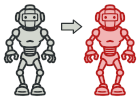
Python 原型模式讲解和代码示例
原型是一种创建型设计模式, 使你能够复制对象, 甚至是复杂对象, 而又无需使代码依赖它们所属的类。
所有的原型类都必须有一个通用的接口, 使得即使在对象所属的具体类未知的情况下也能复制对象。 原型对象可以生成自身的完整副本, 因为相同类的对象可以相互访问对方的私有成员变量。
复杂度:
流行度:
使用示例: Python 的 Cloneable (克隆) 组件就是立即可用的原型模式。
识别方法: 原型可以简单地通过 clone或 copy等方法来识别。
概念示例
本例说明了原型设计模式的结构并重点回答了下面的问题:
- 它由哪些类组成?
- 这些类扮演了哪些角色?
- 模式中的各个元素会以何种方式相互关联?
main.py: 概念示例
import copy
class SelfReferencingEntity:
def __init__(self):
self.parent = None
def set_parent(self, parent):
self.parent = parent
class SomeComponent:
"""
Python provides its own interface of Prototype via `copy.copy` and
`copy.deepcopy` functions. And any class that wants to implement custom
implementations have to override `__copy__` and `__deepcopy__` member
functions.
"""
def __init__(self, some_int, some_list_of_objects, some_circular_ref):
self.some_int = some_int
self.some_list_of_objects = some_list_of_objects
self.some_circular_ref = some_circular_ref
def __copy__(self):
"""
Create a shallow copy. This method will be called whenever someone calls
`copy.copy` with this object and the returned value is returned as the
new shallow copy.
"""
# First, let's create copies of the nested objects.
some_list_of_objects = copy.copy(self.some_list_of_objects)
some_circular_ref = copy.copy(self.some_circular_ref)
# Then, let's clone the object itself, using the prepared clones of the
# nested objects.
new = self.__class__(
self.some_int, some_list_of_objects, some_circular_ref
)
new.__dict__.update(self.__dict__)
return new
def __deepcopy__(self, memo=None):
"""
Create a deep copy. This method will be called whenever someone calls
`copy.deepcopy` with this object and the returned value is returned as
the new deep copy.
What is the use of the argument `memo`? Memo is the dictionary that is
used by the `deepcopy` library to prevent infinite recursive copies in
instances of circular references. Pass it to all the `deepcopy` calls
you make in the `__deepcopy__` implementation to prevent infinite
recursions.
"""
if memo is None:
memo = {}
# First, let's create copies of the nested objects.
some_list_of_objects = copy.deepcopy(self.some_list_of_objects, memo)
some_circular_ref = copy.deepcopy(self.some_circular_ref, memo)
# Then, let's clone the object itself, using the prepared clones of the
# nested objects.
new = self.__class__(
self.some_int, some_list_of_objects, some_circular_ref
)
new.__dict__ = copy.deepcopy(self.__dict__, memo)
return new
if __name__ == "__main__":
list_of_objects = [1, {1, 2, 3}, [1, 2, 3]]
circular_ref = SelfReferencingEntity()
component = SomeComponent(23, list_of_objects, circular_ref)
circular_ref.set_parent(component)
shallow_copied_component = copy.copy(component)
# Let's change the list in shallow_copied_component and see if it changes in
# component.
shallow_copied_component.some_list_of_objects.append("another object")
if component.some_list_of_objects[-1] == "another object":
print(
"Adding elements to `shallow_copied_component`'s "
"some_list_of_objects adds it to `component`'s "
"some_list_of_objects."
)
else:
print(
"Adding elements to `shallow_copied_component`'s "
"some_list_of_objects doesn't add it to `component`'s "
"some_list_of_objects."
)
# Let's change the set in the list of objects.
component.some_list_of_objects[1].add(4)
if 4 in shallow_copied_component.some_list_of_objects[1]:
print(
"Changing objects in the `component`'s some_list_of_objects "
"changes that object in `shallow_copied_component`'s "
"some_list_of_objects."
)
else:
print(
"Changing objects in the `component`'s some_list_of_objects "
"doesn't change that object in `shallow_copied_component`'s "
"some_list_of_objects."
)
deep_copied_component = copy.deepcopy(component)
# Let's change the list in deep_copied_component and see if it changes in
# component.
deep_copied_component.some_list_of_objects.append("one more object")
if component.some_list_of_objects[-1] == "one more object":
print(
"Adding elements to `deep_copied_component`'s "
"some_list_of_objects adds it to `component`'s "
"some_list_of_objects."
)
else:
print(
"Adding elements to `deep_copied_component`'s "
"some_list_of_objects doesn't add it to `component`'s "
"some_list_of_objects."
)
# Let's change the set in the list of objects.
component.some_list_of_objects[1].add(10)
if 10 in deep_copied_component.some_list_of_objects[1]:
print(
"Changing objects in the `component`'s some_list_of_objects "
"changes that object in `deep_copied_component`'s "
"some_list_of_objects."
)
else:
print(
"Changing objects in the `component`'s some_list_of_objects "
"doesn't change that object in `deep_copied_component`'s "
"some_list_of_objects."
)
print(
f"id(deep_copied_component.some_circular_ref.parent): "
f"{id(deep_copied_component.some_circular_ref.parent)}"
)
print(
f"id(deep_copied_component.some_circular_ref.parent.some_circular_ref.parent): "
f"{id(deep_copied_component.some_circular_ref.parent.some_circular_ref.parent)}"
)
print(
"^^ This shows that deepcopied objects contain same reference, they "
"are not cloned repeatedly."
)
Output.txt: 执行结果
Adding elements to `shallow_copied_component`'s some_list_of_objects adds it to `component`'s some_list_of_objects.
Changing objects in the `component`'s some_list_of_objects changes that object in `shallow_copied_component`'s some_list_of_objects.
Adding elements to `deep_copied_component`'s some_list_of_objects doesn't add it to `component`'s some_list_of_objects.
Changing objects in the `component`'s some_list_of_objects doesn't change that object in `deep_copied_component`'s some_list_of_objects.
id(deep_copied_component.some_circular_ref.parent): 4429472784
id(deep_copied_component.some_circular_ref.parent.some_circular_ref.parent): 4429472784
^^ This shows that deepcopied objects contain same reference, they are not cloned repeatedly.